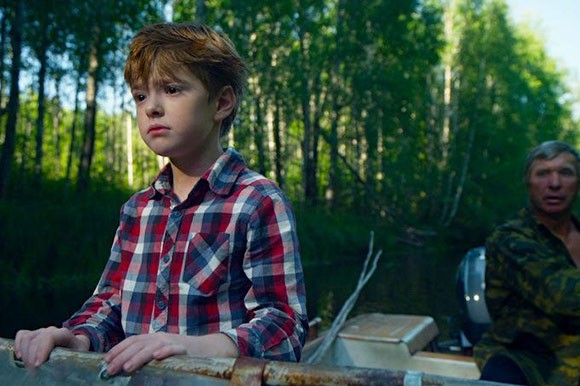The film focuses on the lives of the inhabitants of a remote village in Russia’s far north on the shores of Lake Kenozero. The very long opening shot over the shoulder of the pilot of a small motor boat crossing a lake that seems to go on forever gives a sense of the vastness, beauty and isolation of the village. Crossing the lake by boat is the only way to reach the mainland and the nearest large town, Arkhangelsk. The pilot of the boat is the village postman Lyokha played by Alexei Tryapitsyn the real-life postman of the village. Lyokha makes regular runs in his boat to the mainland is the villagers’ only connection to the outside.
The isolation of the small community has meant the inhabitants about been left behind as Russia surges into the 21st century but Konchalovsky makes it clear that there are human values that the villagers retain that have also been left behind in the rush of progress. They have quarrels and problems but they depend on each other as a real community.
Lyokha who is a recovering alcoholic is a patient and kind-hearted man who also delivers the villagers pension money, stops to chat, bring back a few items from the shops on the mainland and generally takes time to look after his fellow man.
He develops a crush on his neighbor Irina played by theatre actress, Irina Ermolova, one of the few professionals in the cast, and dreams of having a relationship with her. He ends up looking after her fatherless young son, Timur, played by Timur Bondarenko, taking him fishing and teaching to boy how to grow vegetables.
One of the most magical images in the film is the cat the Lyokha imagines he sees on his chest or in his room. Konchalovsky achieves more cinematic surrealism with this simple image of a real cat that most Hollywood films achieve with 100m USD of special effects.
A crisis for Lyoskha and the villagers appears when the motor of his boat is stolen. He feels his responsibility to his fellow villagers deeply and tries to get government help to replace the motor only to find out that it is his fellow villagers who have stolen the motor and are drinking away the proceeds of its sale.
Devastated Lyokha leaves and heads to the city to begin a new life living with his sister. But after a few days he returns to the village. Despite their betrayal the sense of community is stronger and Lyokha realizes that he does not want to live anywhere else.
Konchalovsky said: “Contemplation is a state in which a person is very aware of his unity with the universe. Perhaps this film is my attempt at sharpening my hearing and trying to listen to the quiet whisper of the universe.”
The Postman’s White Nights is a profound examination of both the world around us and of cinema as an art form.
Credits: The Postman’s White Nights (Russia)
Directed by Andrei Konchalovsky
Cast: Aleksey Tryapitsyn, Irina Ermolova, Timur Bondarenko




















